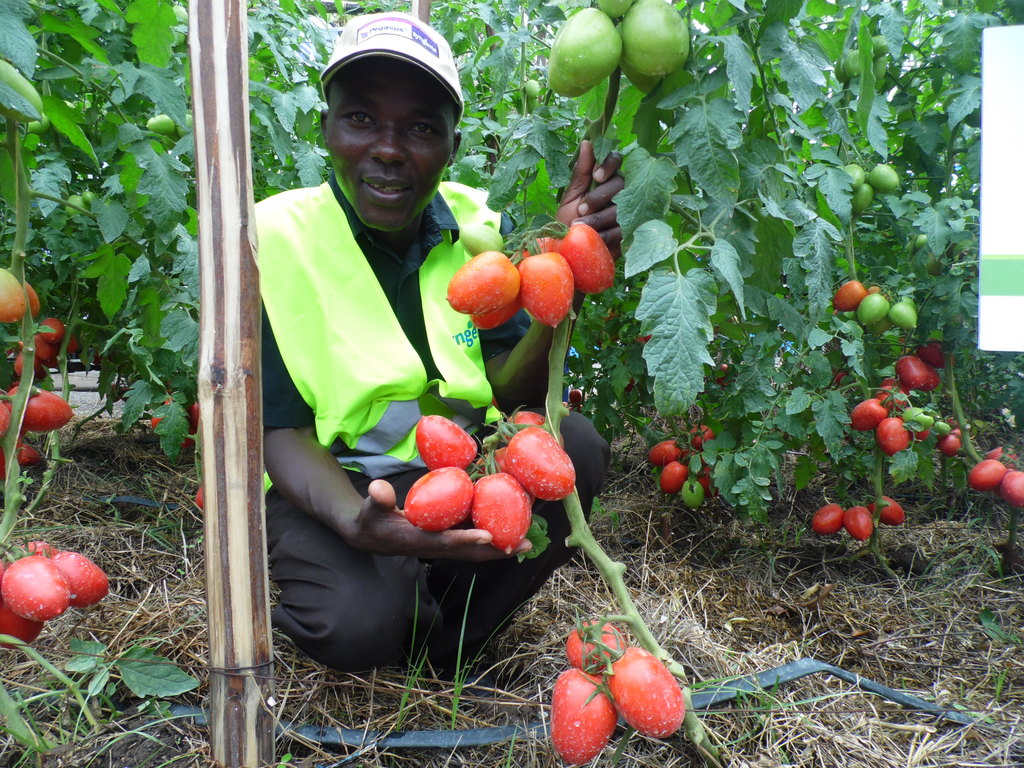A Ugandan based scientist, Samuel Kamya, has developed a bio fertilizer using a seed bio-coating technology as a solution to combat diseases in crops wilt in tomatoes, pepper, eggplant and plants in the solanaceae family.
The biological fertilizer is self-regenerating. This means that it's a single application fertilizer whose effects stay within the soil. By interacting with plant roots thanks to a special ingredient, the bio-fertilizer increases crop tolerance to drought.
Related content
Scientist creates app to detect crop diseases
Scientists develop biopesticide to tame fruit fly
Scientists pitch for herbal medicine to cure livestock diseases
“In 2014, I had friends who were engaged in agriculture and were having trouble knowing what to do and what was happening. In some cases losses in their farms were too severe. Whole gardens were lost to wilt for example. With this magnitude of a problem, I and my team set out to develop the needed solutions,” said Kamya.
“In 2017, this initiative led us to develop an entirely new type of biologically inspired single application fertilizer that resulted in faster crop growth, higher yields, increased tolerance to drought etc. We also developed biological fungicides for spraying. The biological fertilizer is already on market as well as a version of the fungicide,”
Kamya’s first efforts were to develop a solution that would counter ralstonia, the bacteria responsible for bacterial wilt for crops in the Solanaceae family. He achieved this through a project in which the crops showed greater resistance to soil borne diseases.
To begin with, some farmers with Samuel’s blessings experimented with bananas to control xanthomonas and fusarium wilt diseases. The results were positive with the bio-fertilizer showing a near 95 per cent ability to protect the bananas against the two diseases. Samuel notes that with proper and thorough application procedures one can obtain 100 per cent protection.
He then quickly realized that this technology could also be used to harness through enzymic and organic acid action the conversion of rather unusable phosphorus into a form that a plant can utilize.
“Remember that with chemical fertilizers; only about 20% is utilized by the plant. The rest is bound in forms that plants can't use, the rest is wasted,” said Kamya.
The bio-fertilizer k70 was designed to unlock and solubilize any bound phosphorus into a form that any plant can use. This was achieved by tweaking the formulation to allow the plant sequester iron, convert atmospheric nitrogen into a form that's usable by plants.
By converting atmospheric nitrogen into higher forms of nitrogen such as amino acids and plant growth hormones, the bio-fertilizer increases crop growth.
The discovery of this drought tolerance increasing ability allowed Kamya to develop a new technology that he hopes can be used to reclaim desert like lands for agriculture. The Bio-fertilizer is now being processed into an off white powder. This will allow the fertilizer to stay longer.
“All that a farmer with planting material needs is open a sachet and add the fertilizer to a little water depending on the volume of seeds or planting material. He then treats the planting material by soaking it in the made bio-fertilizer solution,” said kamya.
It takes at least 2hrs to fully activate the bio-coating activity of the bio-fertilizer although six hours is better. After this session the seeds can be planted straight away or air dried under shade if the farmer plans to plant later.
Direct sunshine exposure should be avoided as sun light is damaging to some of the active components in the fertilizer.

















Comments powered by CComment